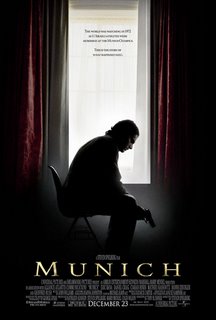
I often find that a trip to the cinema on a Sunday evening can help alleviate the misery of impending doom that is the beginning of another working week. A deeply thought-provoking film is a particularly useful way of refreshing the mind when Monday morning looms ominously on the horizon. So with an open mind I went to see the above. And here are my thoughts on it:
Spielberg’s account of an Israeli secret service cell assigned with the task of tracking down and assassinating the perpetrators of the terrorist acts during the 1972 Munich Olympics is a tense, gripping film. It works well as an entertaining political thriller in its own right, and it's easy to forget that it's based on real events, although it's not clear to what extent the scenes depicted are factual, or to what degree they are fictionalised. However the use of real news archive footage from the era works well alongside the dramatised events. The film is shot through a dark filter, which adds to the ominous tone and effectively puts into context the chilling central theme with numerous twists and turns in the plot.
Throughout the course of approximately two and a half hours the viewer is propelled into a sinister, shadowy world of espionage, state-licensed terrorism, intelligence, ruthless renegade agents, blood money and cloak-and-dagger deals. The global political climate of the 1970s as an era of international terrorism is firmly put into context, with fleeting references to various paramilitary organisations such as the Red Army Faction, ETA, IRA, PLO and notorious international terrorist Carlos the Jackal.
The events unfold from the point of view of Avner Kaufman, a young Mossad agent who is drafted into the close-knit cell of fellow hitmen to eliminate the ring leaders of the pro-Palestinian Black September group. Eric Bana is superb in his portrayal of the central character, whose pregnant wife is blissfully unaware of his true occupation. The juxtaposition of Kaufman's parallel lives as cold-blooded killer and family man is highly effective.
There is a strong supporting cast of accomplished actors which includes Ciarán Hinds (almost unrecognisable from his recent portrayal of Gaius Julius Caesar in the recent BBC epic Rome), the new James Bond Daniel Craig, versatile Australian actor Geoffrey Rush and French actor/director Mathieu Kassovitz.
The action follows the cell as they move from one location to another in search of a target, with Rome, Paris, London, Cyprus and Beirut all featuring. The initial concept of fighting for the Jewish cause (as their amoral handlers would have them believe) soon falls by the wayside with the revelation that things aren’t quite what they seem. It seems that a dirty war of attrition is being waged among the global espionage networks and terrorist groups, with the distinction between the two becoming more and more blurred as the story develops. The cancerous culture of amorality is not unlike that depicted in the spaghetti westerns or Mafia films, where there are no such things as "good guys" and "bad guys". Spielberg's moral message is obvious throughout the film - fighting one form of terrorism with another can never be justified. In short, violence simply breeds more violence and there are no winners in such a war. This becomes apparent along the way, when civilians are accidentally caught up in the crossfire and Kaufman, haunted by constant flashbacks of Munich begins to question the morality of his actions. Of particular significance is the subtly hidden message in the very last shot, with chilling allusions to another act of mass terrorism which would be perpetrated three decades later.
Not surprisingly the film has its fair share of bloodshed and violence with graphic scenes of explosions and shootings which leave little to the imagination. It is however not without its humorous moments.
More than thirty years on from the aftermath of Munich, the underlying theme remains as topical as ever. The prevailing climate of fear and uncertainty in the wake of 9/11 is omnipresent throughout the film. Current events such as the fundamentalist furore over the Danish cartoons, the rise of Hamas in Palestine and the ongoing volatile situation in Iraq all seem relevant to the story. A story which is not yet over.
Definitely worth seeing.
Ciarán Ward
Tuesday, February 21, 2006
Steven Spielberg's Munich
Subscribe to:
Post Comments (Atom)

1 comment:
We call that feeling of impending doom "don't wanna go to school blues." the more I talk to people, the more I realise it's universal.
Good review. I think you captured the film fairly and accurately.
Post a Comment